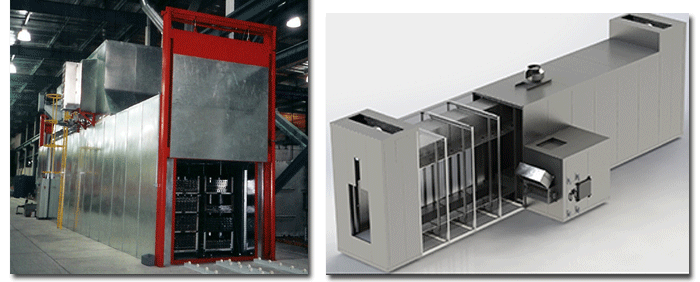JIPL is New Zealand’s foremost Design-House for quality, cost-effective Industrial Ovens. JIPL specialize in quality industrial ovens and we use our extensive knowledge of heat transfer technology to design tailor-made ovens to suit each client’s specific requirements.
JIPL’s modular designs and use of precision sheet metal allows our products to be flat packed which makes exporting ideal and economical.
Industrial ovens cover a wide variety of processes: from product pre-heat, drying, curing, baking, solvent removal, to thermal bonding and laminating, heat-set, heat-shrink, heat-treat, thermal ageing and other heat treatment processing of materials. There is such a huge variety of factors that need to be taken into account when designing an industrial oven, that understanding the best option for each particular process can be a daunting task and requires expert advice which is JIPL’s speciality.
Using thermal engineering and forced air convection techniques, JIPL designs and manufactures ovens and other heating and cooling plant that in every case improves production and product quality, and significantly reduces energy costs. JIPL’s modular oven enables maximum production in any operation.
How they work
All oven processes require heat transfer, which can be accomplished through conduction, convection or infrared/radiant heat. Often, industrial ovens are designed using a combination of these heat transfer types, as often no single heating technology is perfect for every process.
Generally, there are two basic oven configurations: batch and continuous. Most industrial ovens fall under the category of batch ovens, which process an individual product(s) in a single group. Continuous ovens can move significant quantities of products using an automated conveyor system (often overhead types for efficiency).
The convection oven is the most common type and uses airflow to provide the optimum volume of air at an optimum velocity and temperature for the best possible heat transfer within the required processing time.
Control of airflow is the essential factor in an oven’s performance – hence the need for specialist design.
Infra-red ovens are suitable for specific products and require an in-depth knowledge if IR wave-length and the effects on different materials being heated.
OVENS AREN’T JUST BOXES WITH A HEAT SOURCE INSIDE!
Off-the-shelf solutions may work for some processes, but for the majority of cases, a specifically designed/built oven is a long-term cost-saver. The main benefits being the identical processing of products each time – ensuring quality and high productivity.
Here are just a few of the things you need to consider when looking at a new oven or upgrading your existing oven…..
- Continuous or batch oven – which type best suits your product/needs?
- Does the oven conform to current health & safety legislation? Especially important for flammable
processes - What size oven do you really need – how much product do you need to process in what time?
- How will the oven heat transfer system ensure even temperatures throughout the oven to avoid
variations in your product? - Is the oven design and construction able to cater to the daily changing thermal loads without
deterioration? - Are the process heaters and fans specified for the thermal load and are they properly matched?

